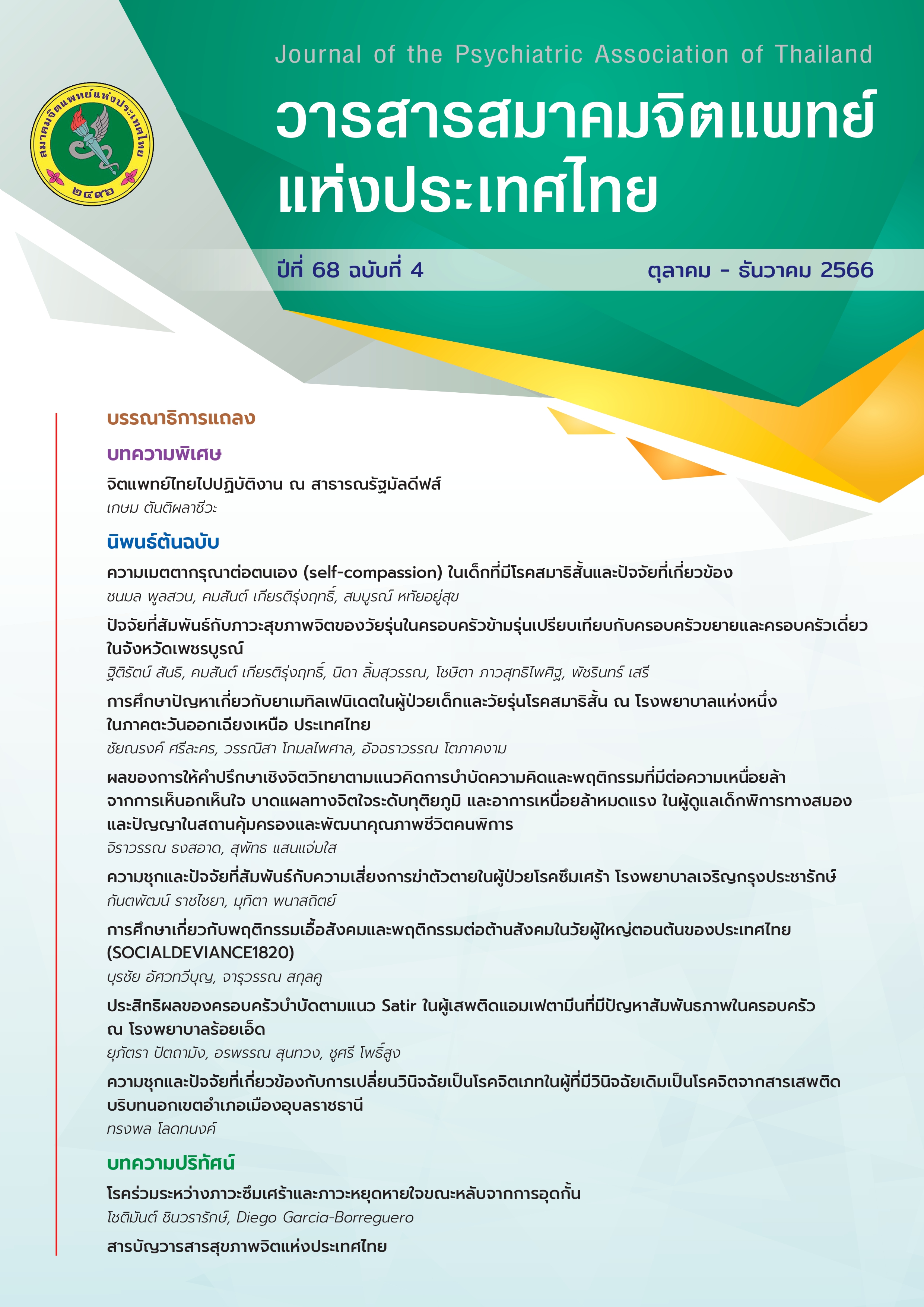การศึกษาปัญหาเกี่ยวกับยาเมทิลเฟนิเดตในผู้ป่วยเด็กและวัยรุ่นโรคสมาธิสั้น ณ โรงพยาบาลแห่งหนึ่งในภาคตะวันออกเฉียงเหนือ ประเทศไทย
Main Article Content
บทคัดย่อ
วัตถุประสงค์ เพื่อศึกษาความชุกและรายละเอียดของปัญหาเกี่ยวกับการใช้ยาเมทิลเฟนิเดตในผู้ป่วยเด็กและวัยรุ่นที่เป็นโรคสมาธิสั้นในสถาบันสุขภาพจิตเด็กและวัยรุ่นภาคตะวันออกเฉียงเหนือ
วิธีการศึกษา การศึกษาแบบตัดขวางในผู้ป่วยอายุ 6 - 18 ปี ที่ได้รับการรักษาโรคสมาธิสั้นด้วยยาเมทิลเฟนิเดต ณ สถาบันสุขภาพจิตเด็กและวัยรุ่นภาคตะวันออกเฉียงเหนือ ระหว่างเดือนตุลาคม พ.ศ. 2565 - มกราคม พ.ศ. 2566 โดยศึกษาปัญหาเกี่ยวกับการใช้ยาเมทิลเฟนิเดต ด้วยเครื่องมือ The Pharmaceutical Care Network Europe (PCNE) version 9.1 ร่วมกับ Naranjo’s algorithm และทำการวิเคราะห์แจกแจงประเภทและลักษณะของปัญหา สาเหตุ วิธีการแก้ไข และการยอมรับต่อการแก้ไขปัญหาในรูปของความถี่และเปอร์เซ็นต์
ผลการศึกษา ผู้ป่วย 286 คน มีอายุเฉลี่ย 10.5 ± 2.9 ปี ส่วนใหญ่ (ร้อยละ 85.3) เป็นเพศชาย มีมัธยฐานระยะเวลาที่เป็นโรคสมาธิสั้น 2.0 ปี (พิสัยควอไทล์ 0.8 ถึง 4.1 ปี) และมีมัธยฐานของระยะเวลาที่ได้รับยาเมทิลเฟนิเดต 1.0 ปี (พิสัยควอไทล์ 0.4 ถึง 2.9 ปี) โดยพบว่าเกิดปัญหาเกี่ยวกับยาเมทิลเฟนิเดตในผู้ป่วย 152 ราย (161 เหตุการณ์) คิดเป็นความชุกร้อยละ 53.1 โดยพบว่าปัญหาด้านความปลอดภัยในการรักษา ร้อยละ 56.5 ซึ่งทั้งหมดเกิดจากเหตุการณ์ไม่พึงประสงค์จากการใช้ยา และปัญหาด้านประสิทธิภาพการรักษาร้อยละ 43.5 โดยอาการไม่พึงประสงค์ที่พบบ่อยที่สุดสามอันดับแรก คือ เบื่ออาหาร (ร้อยละ 57.1) แคะแกะเล็บ (ร้อยละ 7.7) และนอนไม่หลับ (ร้อยละ 7.7) ปัญหาด้านประสิทธิภาพเกือบทั้งหมด (ร้อยละ 94.3) เกิดจากความรู้และพฤติกรรมของผู้ป่วย เช่น ไม่ใช้ยา ใช้ยาน้อยกว่าหรือมากกว่าที่แพทย์สั่ง ไม่เข้าใจเกี่ยวกับการรักษา ในการจัดการกับปัญหาพบว่า ทั้งปัญหาด้านประสิทธิภาพ และความปลอดภัย สามารถแก้ไขได้ที่ผู้ป่วย ร้อยละ 96.3 มีเพียงร้อยละ 2.5 ที่เป็นการจัดการแก้ไขที่บุคลากรทางการแพทย์ และร้อยละ 1.2 แก้ไขที่การเปลี่ยนยา โดยเภสัชกรให้คำแนะนำในการปรับเปลี่ยนยาและการบริหารยา ในด้านการยอมรับต่อการแก้ไขปัญหาจากผู้ป่วยหรือบุคลากรทางการแพทย์ พบว่ามีการยอมรับ ร้อยละ 100
สรุป ในการศึกษานี้พบปัญหาเกี่ยวกับการใช้ยาเมทิลเฟนิเดตในผู้ป่วยเด็กและวัยรุ่นที่เป็นโรคสมาธิสั้น ทั้งด้านประสิทธิภาพในการรักษาและเหตุการณ์ไม่พึงประสงค์จากการใช้ยา จึงควรมีการติดตามการใช้ยาของผู้ป่วยโดยบูรณาการร่วมกันระหว่างบุคลากรทางการแพทย์ รวมถึงการให้ความรู้และสื่อสารกับผู้ป่วยอย่างมีประสิทธิภาพ เพื่อช่วยป้องกันปัญหา หรือตรวจพบและแก้ไขปัญหา ทำให้เกิดผลลัพธ์การรักษาที่ดี
Article Details

อนุญาตภายใต้เงื่อนไข Creative Commons Attribution-NonCommercial-NoDerivatives 4.0 International License.
บทความที่ส่งมาเพื่อพิจารณา ต้องไม่เคยตีพิมพ์หรือได้รับการตอบรับให้ตีพิมพ์ในวารสารฉบับอื่น และต้องไม่อยู่ระหว่างการส่งไปพิจารณาในวารสารอื่น
เอกสารอ้างอิง
American Psychiatric Association. Diagnostic and statistical manual of mental disorders-text revision. 4th ed. Washington, DC: American Psychiatric Association; 2000.
Polanczyk G, de Lima MS, Horta BL, Biederman J, Rohde LA. The worldwide prevalence of ADHD: a systematic review and metaregression analysis. Am J Psychiatry 2007;164(6):942–8.
National Statistical Office. Report on children and adolescents surveyed in 2020. Bangkok; Ministry of Information and Communication Technology, 2021.
Department of Mental Health. Annual report on mental health in 2020 [Internet]. [cited 2022 Apr 1]. Available from: https://dmh.go.th/report/datacenter/hdc/
Wolraich ML, Hagan JF, Allan C, Chan E, Davison D, Earls M, et al. Clinical practice guideline for the diagnosis, evaluation, and treatment of attention-deficit/hyperactivity disorder in children and adolescents. Pediatrics 2019;144(4):1007–22.
Khajehpiri Z, Mahmoudi-Gharaei J, Faghihi T, Karimzadeh I, Khalili H, Mohammadi M. Adverse reactions of methylphenidate in children with attention deficit-hyperactivity disorder: report from a referral center. J Res Pharm Pract 2014;3(4):130–6.
Tobaiqy M, Stewart D, Helms PJ, Williams J, Crum J, Steer C, et al. Parental reporting of adverse drug reactions associated with attention-deficit hyperactivity disorder (ADHD) medications in children attending specialist paediatric clinics in the UK. Drug Saf 2011;34(3):211–9.
Patel MX, David AS. Medication adherence: predictive factors and enhancement strategies. Psychiatry 2007;6(9):357–61.
Gajria K, Lu M, Sikirica V, Greven P, Zhong Y, Qin P, et al. Adherence, persistence, and medication discontinuation in patients with attention-deficit/hyperactivity disorder - a systematic literature review. Neuropsychiatr Dis Treat 2014;10:1543–69.
Foundation Pharmaceutical Care Network Europe. The PCNE classification V 9.1. 2020 [Internet]. 2020 [cited 2020 Nov 8]. Available from: https://www.pcne.org/upload/files/417_PCNE_classification_V9-1_final.pdf
Naranjo CA, Shear NH, Lanctôt KL. Advances in the diagnosis of adverse drug reactions. J Clin Pharmacol 1992;32(10):897–904.
Pimratana W. Associations between caretakers’ attitude, caretakers’ knowledge of attention deficit hyperactivity disorder (ADHD) and child patients’ compliance to take methylphenidate (MPH). Journal of the Psychiatric Association of Thailand 2016;61(1):15–26.
Yamane T. Statistics: an introductory analysis. 3rd ed. New York: Harper and Row; 1973.
Tantipiwattanaskul K. A study of drug related problems in child and adolescent with mental health problem. Journal of Health Science 2019;28(6):986–95.
Hage A, Weymann L, Bliznak L, Marker V, Mechler K, Dittmann RW. Non-adherence to psychotropic medication among adolescents - a systematic review of the literature. Z Kinder Jugendpsychiatr Psychother 2018; 46(1):69-78.
Solmi M, Miola A, Croatto G, Pigato G, Favaro A, Fornaro M, et al. How can we improve antidepressant adherence in the management of depression? A targeted review and 10 clinical recommendations. Braz J Psychiatry 2021;43(2):189–202.
Ninlanon K, Sakulbumrungsil R, Phattanarudee S, Tan-khum T. Factors affecting methylphenidate adherence in children and adolescent with attention deficit hyperactivity disorder. Journal of Mental Health of Thailand 2015;23(1):1–11.
Jumpapan M. The study of prevalence and factors associated with medication nonadherence in child and adolescent psychiatric department, Nakorn Nayok Hospital. Journal of the Psychiatric Association of Thailand 2023;68(1):13–25.
Vucur C, Wirtz DA, Weinhold L, Zipfel M, Schmid M, Schmidt-Wolf IGH, et al. Drug-related problems in head and neck cancer patients identified by repeated medication reviews on consecutive therapy cycles. J Oncol Pharm Pract 2021;27(6):1439–46.


